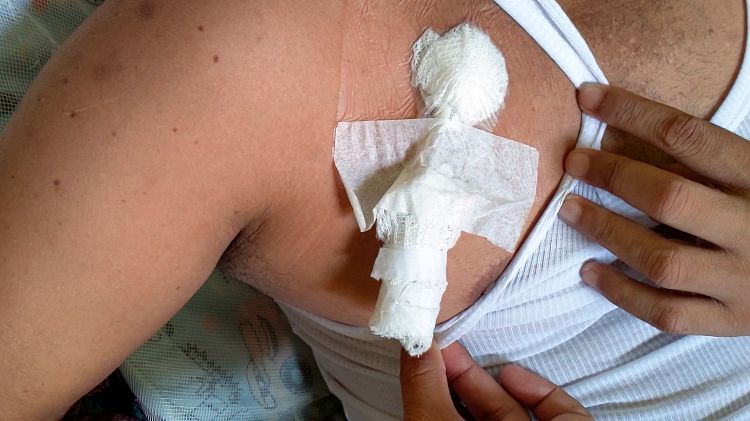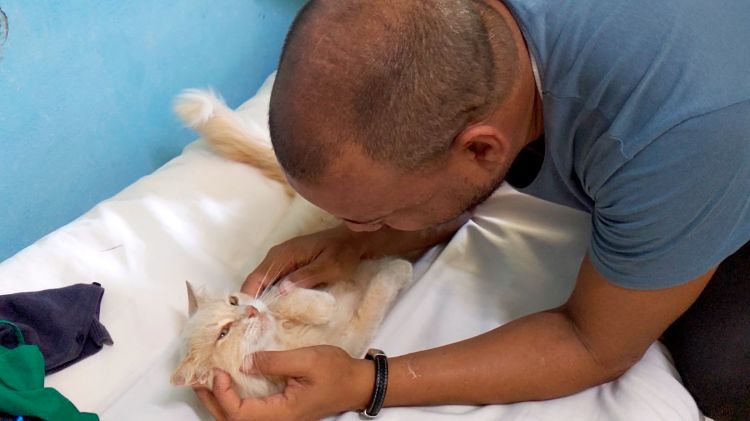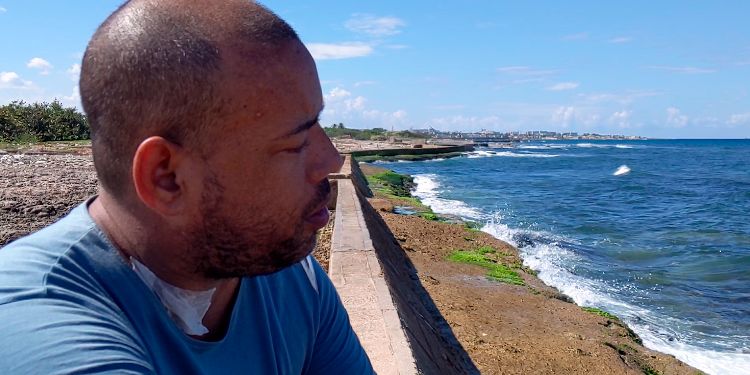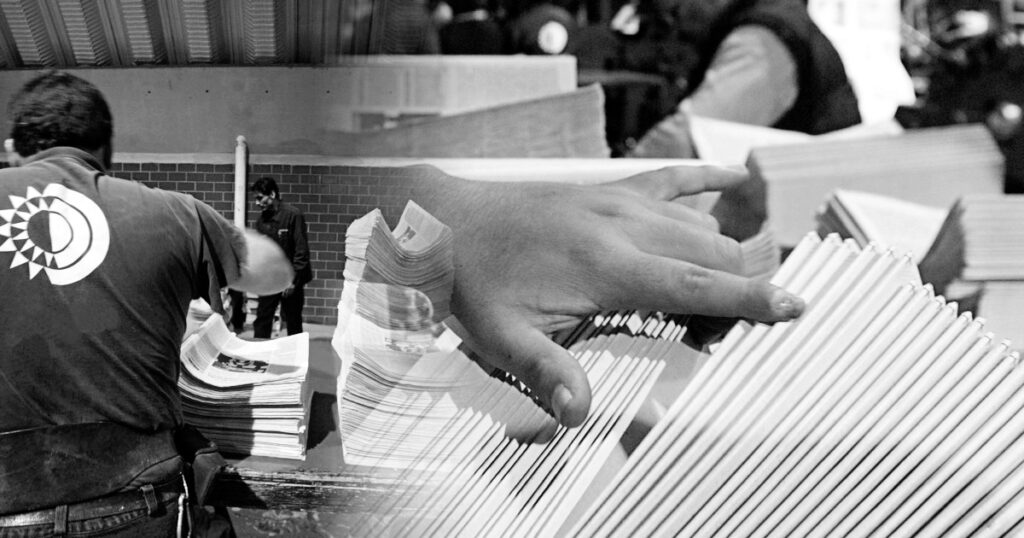Havana Cuba. – “What do we say to the God of Death? Not today!”. The phrase, which reproduces one of the dialogues from the “Game of Thrones” series, became a mantra of resistance for Héctor Lázaro González Aguirre in the face of chronic renal failure (CRF) that he suffers from and that cannot be treated in Cuba.
At 39 years old, the interviewee survives under a permanent regimen of hemodialysis, but that is not enough. Doctors estimate that in about six months the deterioration of his health will be irreversible if he does not receive a humanitarian visa to travel to a country where peritoneal dialysis can be performed.
From Shanghai to Havana, in search of treatment
Héctor Lázaro was diagnosed in 2018 with IRC. At that time he was in China fulfilling an employment contract. In a short time, the aggressiveness of his condition led him to lose his job and, as a consequence, he was left without funds to pay for medical treatments. In these circumstances he decided to return to the Island.
“There they could help me for a while and then it was my turn to pay for all the treatment. It was impossible for me; that is why I decided to pack my bags and come to my country”, she commented.
At home he would have the support of the family, he emphasizes. But he also discovered that the Cuban health system could not offer him the specialized care he required. To make matters worse, his only kidney was severely damaged and a renal biopsy could not be performed to determine the origin of the CRF.
Upon returning to the island, his hemoglobin did not reach 3g/dL and he had lost a lot of weight. He was treated correctly, he admits, but in 2020 everything got worse when his kidney stopped working. Fortunately, he obtained one of the few capabilities that exist in Cuba for the peritoneal dialysis treatment that is performed at the Nephrology Institute of the “Abelardo Bosch” Hospital, better known as the 26-Surgical Clinic.
“I did the treatment and it went very well. For medical reasons I had to leave him. Creatinine and uric acid had been controlled and he could do without dialysis. I spent a year and eight months like this, until I got worse and had to return to hemodialysis”, explains Héctor Lázaro.
Hemodialysis is a therapy that replaces the main functions of the kidneys when they are unable to remove waste from the blood due to end-stage renal disease. The process consists of pumping the blood through a filter that purifies it, returning it to the body already free of toxins and impurities.
Unlike peritoneal dialysis, where the catheter is placed in the abdomen and the peritoneum is used as a filter, in hemodialysis the pumping of the blood is produced by placing a catheter in the blood vessels, or in fistulas – the junction of an artery with a vein― that are created for that purpose.
Héctor Lázaro has had more than 20 catheters changed, which ended up affecting his blood vessels. At present they can only channel one, which is already “quite worn out”.

“Because of that same problem, when I returned to hemodialysis it was not to stay there. The doctors agreed to stabilize me for one or two months and send me back to peritoneal dialysis, but when I improved, the people in charge of the treatment said that there were no supplies to take on more patients,” says Héctor Lázaro, who has been waiting months for a positive response.
“This just saves me a little more time”
A kidney transplant would be the most effective solution; however, it has been discarded. The doctors have informed him that he would have to wait for a deceased donor, but even so, this type of surgery is not being practiced in Cuba at the moment.
Finally, two weeks ago and after months of waiting, they placed a permanent catheter; that is, tunneled in the subclavian region, in the only available vessel. However, the new method only buys you a little more time.
“It was at the Ameijeiras hospital. They are called permanent because they last longer than temporary catheters. They can reach a year, depending on its quality and that of the glass where it is connected. In the conditions of mine, the most possible thing is that it lasts even less, and I only have a few months to treat myself ”, he highlighted.
The lack of options led Héctor Lázaro to ask for help on social networks. Following a video posted on Facebook, several people have approached him with the intention of supporting him in obtaining a humanitarian visa.
“If I don’t get it, in less than six months my life will be in God’s hands again,” he said.
The reality of a patient with chronic renal failure
The use of the catheter put his life on hold. To avoid infections, you cannot walk on the street, use public transport or work.
“The situation in Cuba makes it more difficult. Getting food and supplying basic needs is very expensive. Sick and not working, all that becomes even more complex. That is for the economic part, but the medical part is tougher because it is about being able to preserve life ”, he expanded.
In the medical aspect, he points out, the disease degenerates the organism and the appropriate medicines to combat infections, seizures, chills, tremors and other symptoms, are constantly in short supply.
“It is very common to catch a bacterium, especially in a hot country like Cuba, where you do not have air conditioning where you live. There are no bacteria-fighting products here. For example, there is no Mupirocin or Chlorhexidine, which are ointments that are applied to heal the catheter to eliminate infections,” he lamented.
Likewise, he details, in the hemodialysis rooms there are no gloves for handling. Periodically there is a lack of povidone iodine and adhesive tape, essential elements for healing and subsequent hygiene. The air conditioning and cleanliness of the surgical units also fail.

“It is not a crime to ask for your life”
Although he acknowledges the efforts of the doctors who are treating him, he knows that they cannot do more. Whether he lives another 10 or 15 years depends on whether or not he manages to obtain a humanitarian visa and that the Cuban authorities collaborate with the procedures that he must carry out, one of his fears.
“I had been waiting a long time. It was after the video that they put in the last catheter. I don’t think it’s a coincidence, but it’s not a crime to ask for your life, especially when all resources have been exhausted. I hope that nobody hinders me because my time is running out, ”she stressed.
Héctor Lázaro has his feet on the ground. He knows that the severity of his illness will not allow him to accomplish many of his goals. Even so, he dreams of pursuing his journalism career, accompanying his mother for several more years and creating a family.
Receive information from CubaNet on your cell phone through WhatsApp. Send us a message with the word “CUBA” on the phone +525545038831, You can also subscribe to our electronic newsletter by giving click here.















